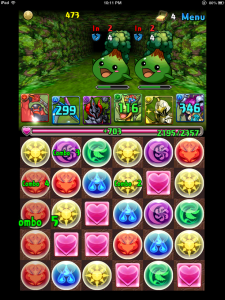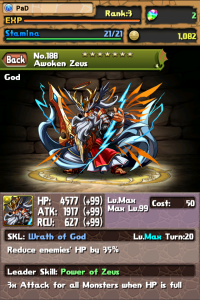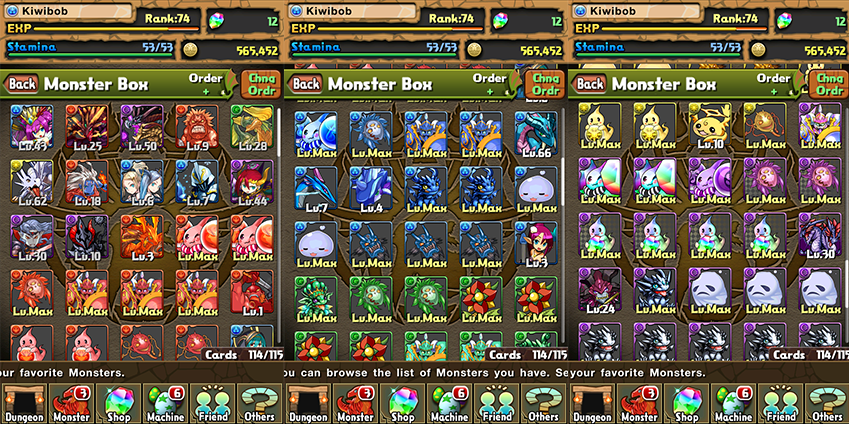Last updated on July 15, 2014
Do not judge according to appearance, but judge with righteous judgment.
John 7:24
Wow, I think I’ve finally found a relatively decent free-to-play mobile game. Rejoice!
Puzzle and Dragon attempts to combine a multitude of different game concepts into a surprisingly holistic package. Firstly, it directly lifts the traditional “match three” puzzle game style made incredibly famous by Candy Crush Saga (and Bejeweled before that, but I want to be hip). Unlike those, however, you’re not merely playing for score or clearing the board; rather, the matching plays directly into the “RPG-lite” elements that form the crux of Puzzle and Dragon’s appeal. There’s no plot to speak of, and you just fight a whole lot of turn-based battles.
Most people will compare Puzzle and Dragon to Pokemon, and that comparison remains most apt. The main game revolves around exploring various areas with a team of six monsters. Mostly, they just play out like a series of rooms with enemy encounters. Each monster associates with one of five different elements: fire, water, wood, light, and dark. Matching the corresponding symbols on the main board will cause the monsters of that color to attack an enemy on screen, which you can helpfully direct by tapping the target monster.
You might think this a simplistic system, but the actual matching contains quite a lot of depth. Merely matching three will certainly do the trick, but scoring 4 or more in a row increases the monster’s default attack modifier. In addition, setting up combos of multiple strings will further increase the damage your monsters do, as well as turning their default attack into an AoE (any string of 5 or more will do that also). Play well, and you can wipe out entire encounters with one swift button press.
Furthermore, we’re not talking about a simple swap of two pieces; you can move any piece anywhere else on the board. This sounds strange on paper, but in practice this allows you to move pieces according to future moves. I’ve made many a large combo this way, and it goes towards making Puzzle and Dragon rather unique.
Enemy monsters wait their turn, as simply indicated by numbers that indicate how long until they attack. Opponents attack a single life meter (i.e., you), and the game’s over if you run out of health. Each combo takes a turn, so you’ll want to chart out your moves carefully. The hearts restore your health which, again, depends on how large a combo you construct, and certain monsters also provide an emergency heal just in case.
The Pokemon influence runs more than skin deep, of course. Each monster retains some special ability that will do certain things to the playing board, such as slowing enemy attacks down, turning one color into another, and possibly resetting the board. Each of these auto-generate after a certain time, so you need to determine when they’ll prove the most useful. Do I wait for the boss to turn all water orbs into fire orbs for a huge fire attack? Or am I going to die now unless I use it? It can get quite tense! It probably goes without saying that you should abuse enemy weaknesses (like Pokemon, again) as often as possible, using light against dark, water against fire, and all the wonder rock-paper-scissors combinations to which I assume you’re familiar.
Since most dungeons follow a theme or require a well-balanced team, you’ll also spend time arranging and strengthening your team composition based on your needs. Some dungeons barrage you with enemies of a particular element, while others require some deft planning and puzzling to finish. I often find a balanced team works the best, since nothing happens if you don’t hold a monster of a particular element. Bringing all fire monsters to a Wind Temple might sound right, but you’ll find yourself without any opportunity to attack should the fire orbs suddenly disappear.
Monsters gain experience by fighting in dungeons, but that’s not the only way to progress. Puzzle and Dragon contains a “fusion” system that allows you to power up monsters by fusing them with other ones for a small fee. In addition, when some monsters reach max level you can evolve them with the use of specific monsters, which certainly strengthens them but also lands them right back at level one. Thus, you need to fight some more, and that’s not a bad thing!
As usual in such Pokemon-inspired games, the “collect them all!” feature swings pretty wide, featuring over 1400 monsters to collect (many of them palette swaps). You’re really just looking for the right abilities to complement your team composition, so the rarity/collecting aspects seems a whole lot less necessary. You also need real-world money or time to enlarge your monster box to even collect near that amount, so it often takes a backseat to the real game. Some of the designs are really out there, though; Cao Cao of ROTK fame has remained a mainstay of my team, and I would barely consider that a “monster”.
Beating a dungeon will earn you currencies and monster eggs. The former consists of a relatively rout gold exchange and Magic Stones, which allow you to continue if defeated in a dungeon or obtain rare monsters via a random dispenser. The chance to get higher monsters increases depending on scheduled events (sorta like MMO holidays). Monster eggs just provide you with more monsters, and that’s unsurprising.
There’s other rewards that derive from its mobile game nature, mostly in terms of allowing for continues, additional stamina (since each dungeon takes stamina…just don’t die if you can help it), and the possibility to obtain monsters via an egg dispensing machine. The game also requires you to use monsters from “friends”, and the selection often will play with your team’s set-up. You can only use them once each time you log onto the game, though. Even so, they just function as if you had a monster, sometimes overpowered, in a six monster set.
None of these features (other than the later one) really seem necessary from my extensive time with the game, though. For being a f2p title that obviously wants me to spend a whole lot of my money, there’s little need to actually spend any if you think about your moves, monsters, and preparations beforehand. Stamina limits how much you can play (since each dungeon requires a set amount), but I never play in bursts longer than twenty minutes. I suppose it depends on how much progress you want to make in a single sitting. If all else fails, a 3DS version will hopefully solve all those microtransactions problems you might have. If you die in a dungeon, you could always just quite, and that’s perfectly viable (although you lose stamina).
The game underlying all this still holds up even though it certainly suffers from monetization strategies like reward removal. Furthermore, the game’s free on mobile platforms, so if the game IS enjoyable and challenging, I see no harm in actually spending money. You never pay to win in Puzzle and Dragon; skill can always trump the stiff difficulty on later dungeons, and that makes all the difference in my mind. Perhaps as I get further things will change, but I somehow doubt it. Again, buy the 3DS version if you’re against such problems (whenver that comes out in the US). I have so far refused to spend any real-world money, and that hasn’t dampened my ability to play at all.
Perhaps I am merely deceived due to the way I play the game (in twenty minute spurts), but this is the first genuinely fun F2P game I’ve ever played that doesn’t seem designed with those monetization strategies in mind. Of course, given that the game never ends, it’s hard for me to say, but I at least recommend giving it a shot either way. I am unwilling to denigrate the game purely because of its business model. That business model rarely interferes with the game, and I am sticking to that story unless somebody can prove otherwise.



